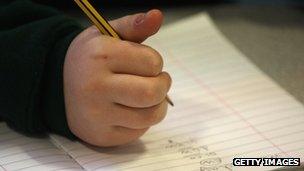Homes of proposed new primary school academies revealed
- Published

The locations of more than 170 English primary schools the government wants to convert into academies have been discovered by the BBC.
The government has previously declined to disclose details of the schools.
Bristol has the highest number on the list with 13 in total, but critics say some schools have been unfairly targeted as 'underperforming'.
The Department for Education says academies have helped improve standards in hundreds of struggling schools.
BBC Radio 4's The Report contacted all local authorities in England to ask if they had schools on the government's list of 200 worst-performing primary schools it proposes to convert to academies.
Academy schools operate independently from local authority control and are instead managed by a sponsor.
The responses received by The Report identified more than 170 schools in more than 50 local authorities on the government's list of proposed academies. Bristol has the highest number on the list with 13 primaries facing conversion to academy status.
Birmingham has 12 primary schools on the list, followed by Lancashire with eight schools and Kent with seven.
Some local authorities refused to reveal whether or not they had primary schools on the government's list, including West Sussex and Wiltshire.
However, the education union the Association of Teachers and Lecturers (ATL) told the BBC that both West Sussex and Wiltshire also have seven primary schools which the government wants to convert to academies.
Schools 'unfairly targeted'
The Department for Education (DfE) says a primary school is deemed to be failing if fewer than 60% of its pupils achieve level 4 or above in English and Maths and fail to make average progress in English and Maths.
The schools which have been targeted for conversion to academy status have been below this level for at least 5 years up to 2010, the DfE says, but some of the schools selected say they are above this standard.
The head teacher of one of the Birmingham primary schools marked for conversion to academy status, who did not want to be identified, said her school had met the minimum criteria.
However, in September 2011 an official from the DfE visited her school and asked to speak to her alone:
"It was very much the man from the ministry coming to see me," she told The Report.
The head teacher said she was "very surprised" to be told that her school had to become an academy and she had "felt in the dark and coerced into doing certain things because we have to".
Many of the primary schools on the government's list of 200 flagged for academy status say they have been unfairly targeted as they are not among the worst-performing schools in their region.
Academies 'improve schools'
Professor of education research at Birmingham University Stephen Gorard analysed performance data for the 12 primary schools flagged for academy status in Birmingham.
"Of the schools we have identified, only 7 of them come in the lowest 50 attaining schools in Birmingham," he told the BBC.
Prof Gorard also found that on one of the government's key measures - the progress between key stage levels 1 and 2 - the schools targeted in Birmingham had made above average progress for their local education authority and for England as a whole.
There has already been opposition from schools fighting the government's demand for them to convert to academy status - notably in the London Borough of Haringey, where 4 schools have been told by the government they must become sponsored academies.
In a parliamentary debate on the issue the Labour MP for Tottenham David Lammy claimed there were 2,594 schools in England that had worse results than his former school Downhills - one of the Haringey schools currently opposing plans to be converted into an academy.
A DfE spokesman told the BBC: "We consider the strong external challenge and support from an Academy sponsor to be the best way to improve schools that are consistently underperforming.
"Academies have already turned around hundreds of struggling schools across the country and are improving their results at twice the national average rate.
"We want to drive up standards, so that students can reach their true potential."
The Report is on BBC Radio 4 Thursday, 16 February at 20:00 GMT. Listen via the Radio 4 website or download the programme podcast.
- Published10 February 2012
- Published31 January 2012
- Published10 January 2012
- Published4 January 2012
- Published16 June 2011